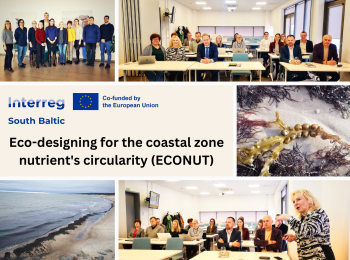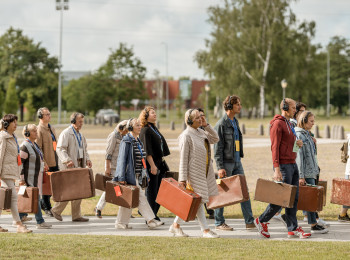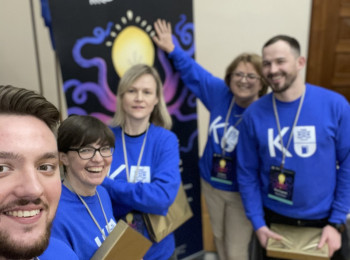 |
Under climate change, eutrophication and soil degradation conditions, the Baltic Sea region is facing the challenge of recovering and obtaining nutrients. The Baltic Sea coastal area is rich in biomass resources (algae, macrophytes, mussel shells, beach wrack), which can be used in agriculture for sustainable food production. One of the possibilities consistent with the circular economy is the use of marine biomass resources as both a fertilizer and a source of nutrient for further recovery. These solutions will prevent nutrients from dispersing into the environment and becoming pollutants. Nutrient-rich coastal biomass can be used to stabilize dune slopes as well as enhance their biodiversity.
Klaipeda University as a leading partner together with partners from Poland, Sweden, Germany and Denmark (with the support of associated partners from Finland), has prepared an application and won EU financing under the 2021-2027 Interreg VI-A South Baltic cross-border cooperation programme for the implementation of the “Eco-designing for the coastal zone nutrient's circularity” project. The acronym of the project is ECONUT.
The overall project objective is to design and develop the technology of the nutrients' flow cycle following the circular economy and sustainable soil and water management principles for a regional bioeconomy. We will work on development of technologies of the nutrients’ flow’s circularity and sustainable usage of soil and water ecosystems as well as on creation of added-value products for agriculture and dune protection from wind erosions and storm floods. As a result, we will have two developed technologies and three pilot cases. An evaluation of the impact of beach wrack removal from the coast and its application for soil fertility, slope stability and biodiversity to climate change will be done. At the project end, we will focus on market analysis for pilot technologies and creation of business models of developed technologies and added-value products.
The project involves six partners: Klaipeda University, Lithuania; Lithuanian Research Centre for Agriculture and Forestry, Lithuania; Gdansk University of Technology, Poland; Sustainable Development Skåne, Sweden; University of Rostock, Germany and University of Southern Denmark, Denmark. The partners are supported by six associated partners
from Administration of Silale's District Municipality (Lithuania), JSC Palanga communal utility (Lithuania), John Nurminen Foundation (Finland), Finnish Environment Institute (Finland), Regional Inspectorate for Environmental Protection in Gdansk (Poland) and En God Granne (Sweden). Klaipeda University leads the project.
As stakeholders, we expecting to involve into the project South Baltic region farmers, agricultural specialists, local and regional authorities (municipalities), environmental protection agencies, public health care and food risk assessment institutions, entrepreneurs, scientists, NGO and public.
Project duration: 1st September, 2023 – 31st August, 2026.
Total project budget is 1 473 550,00 EUR (ERDF co-financing 1 178 840,00 EUR).
Project No. STHB.02.03-IP.01-0004/23.
The project is co-financed by the EU European Regional Development Fund (ERDF) under the 2021-2027 Interreg VI-A South Baltic cross-border cooperation programme. More information about the programme: www.southbaltic.eu






